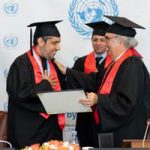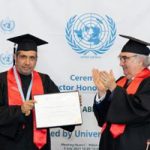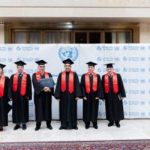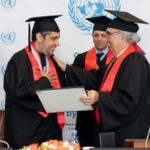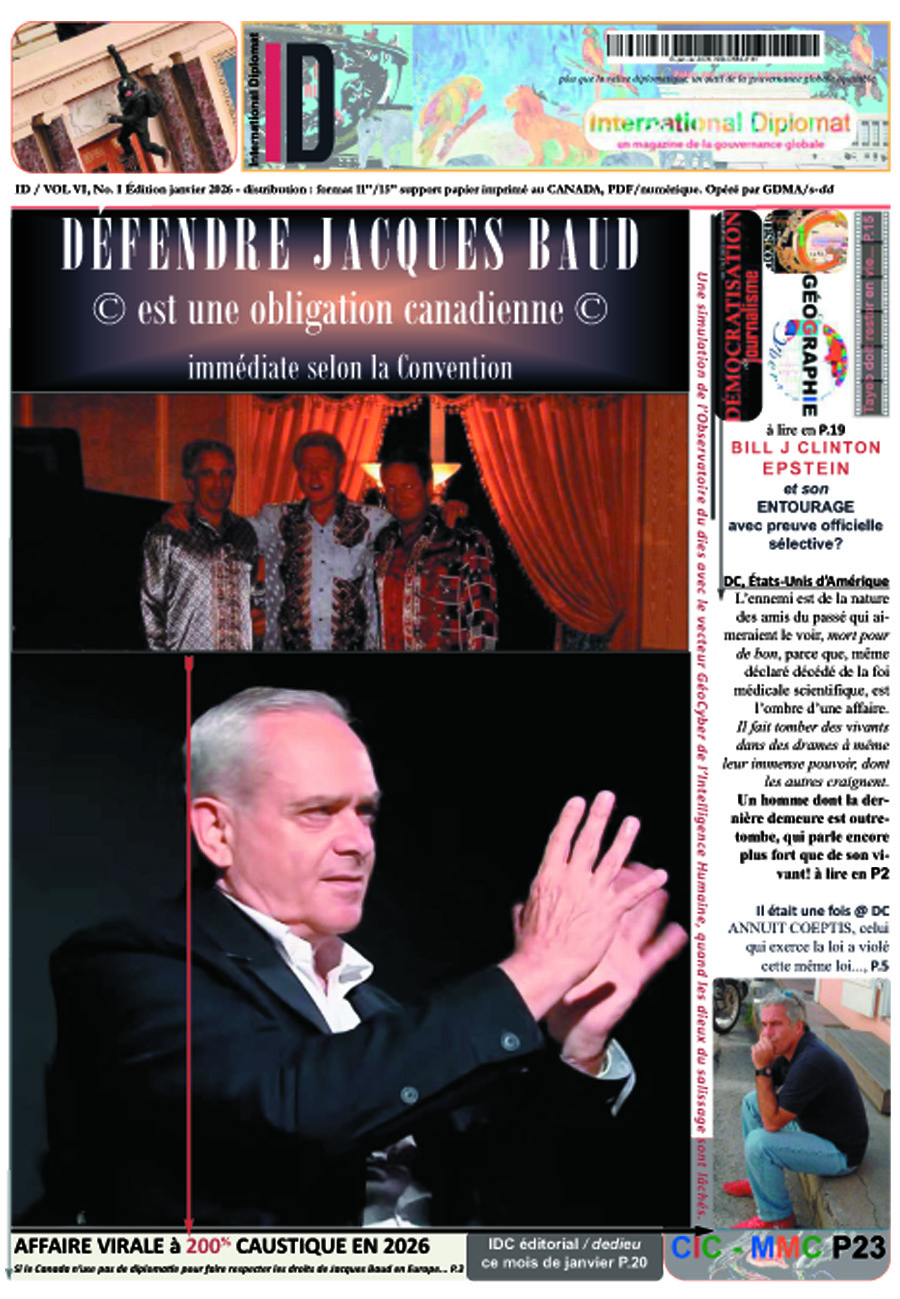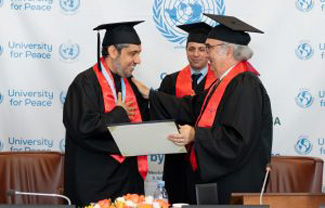
Interview with his Excellency Dr Mohammad bin Abdulkarim Alissa, Secretary General of the Muslim World League
- by Marit Fosse
Q: Your Excellency, you are widely known as a leading global voice in the field of moderate Islam and your commitment to educating the world about the true message of religion, which calls for empathy, understanding and cooperation among all. How have you taken on this role and position?
A: I grew up in Saudi Arabia and Islam has always been an integral part of my life and a fundamental aspect of my childhood and family life and has shaped the person I am today. I knew from an early age that I wanted to apply the values I learned: empathy, respect and love for others, and to help and assist the needy. I studied jurisprudence (Fiqh) at university and held many positions in the public sector in Saudi Arabia until I was appointed Minister of Justice. I was very pleased to be the first to grant women a license to practice law in the Kingdom of Saudi Arabia. Through my experiences, I was made aware of the true principles of moderate Islam and Islam taught me the importance of promoting coexistence and acceptance of others of different religions, beliefs and ideologies. It has taught me that we must all confront the ideology that fuels violence and terrorism. It instilled in me a true passion to protect everyone from hatred and discrimination, especially women and children.
This is what I do every day in the duties assigned to me, as I have the honor of meeting and building bridges of understanding with my brothers and sisters of other religions and beliefs. I have a platform that allows me to reach millions of people and allows me to directly confront hateful, racist, violent thinkers and their rhetoric. I have the opportunity to reach out to threatened communities around the world to show them that we care. With every conversation, meeting, initiative, visit, and program, I have the opportunity to promote peace, coexistence, empathy, and the application of the values that have made me the person I am now.
Q: What about your role when you were Minister of Justice? Did you contribute to that role?
A: The work of the Ministry of Justice in the Kingdom of Saudi Arabia is to provide logistical services to the judiciary, in particular securing court buildings and notary departments dedicated to the notarization of contracts, powers of attorney, marriages, etc., and fully equipping these departments, including with electronic services and administrative staff, as well as proposing justice-related bills. That was my official duty at the time. In terms of intellectual involvement, I had intellectual contributions but they were limited compared to what I have today.
Q: Didn’t you have any direct involvement with the judicial system and human rights?
A: According to the Law of the Judiciary of the Kingdom of Saudi Arabia, the Minister of Justice is not allowed to interfere with the judiciary or the public prosecution, and this is a wonderful characteristic that has strengthened the concept of independence of powers. The judicial system in the Kingdom of Saudi Arabia is totally independent of the Minister of Justice and any other authority. The same is true for the public prosecution and investigation. No one can interfere, neither the minister nor anyone else. The judges themselves are in charge of the Kingdom’s judicial system and the Supreme Court supervises judicial decisions to prevent the violation of established judicial principles. Even the Supreme Judicial Council of the Kingdom does not interfere in judicial decisions and its work is limited only to the functional affairs of the judges, prerogatives clearly provided for by the Law on the Judiciary and which have nothing to do with their judicial work. Their work is something else and it is completely independent, and this is what has empowered the judges. Indeed, the first articles of the Law on the Judiciary in the Kingdom established this wonderful principle. As far as human rights in the Kingdom are concerned, two bodies, one governmental and one non-governmental, are responsible for this matter, and both of them are doing their job properly. In addition, the Shura Council in the Kingdom has control over the work of the official bodies. It monitors their performance and issues effective reports in this regard.
Q: You were recently awarded an honorary degree from the United Nations University of Peace for your outstanding work in peacemaking and understanding between peoples. What does this recognition mean to you and how will it support your work?
A: Recognition is not the motivation for me to do the work I do. However, I greatly appreciate this honor from this prestigious institution. In all the work I do, I am fully committed to working for the promotion of peace and harmony. We all have a sacred duty to promote these values and to continue efforts to build new bridges of cooperation and partnership, regardless of honors, awards or any other such recognition. I will continue to strive to help build a better world, not only for our present but also for future generations.
Q: You are the Secretary-General of the Muslim World League, can you introduce the League and the work you do?
A: The Muslim World League is an international non-governmental organization based in the holy city of Mecca. Through our work around the world, we are committed to clarifying the true and moderate principles of Islam by promoting peace, harmony and understanding. We represent the entire Muslim community. Within our organization there are Sunnis, Shiites, Druze and others. We strive every day to implement this comprehensive and inclusive approach that focuses on spreading these values.
We have established partnerships and relationships with other leading faith-based institutions to promote interfaith cooperation and understanding. We have established global education programs to stem the roots of violent extremism, and we provide critical humanitarian assistance to threatened communities around the world, both Muslim and non-Muslim, without discrimination. This is what it means to be Muslim. We will continue to work to activate a constructive dialogue to find common solutions, taking into account religious and cultural diversity and striving to protect human rights for all.
Q: You live in a historic and legendary city: Mecca. Many people want to visit Mecca, and there are even those who dream of living there. Out of curiosity, tell us about life in Mecca?
A: Mecca is the holiest place in Islam and has a special place in the hearts and minds of all Muslims. It is the birthplace of our Prophet Muhammad (may God’s peace and blessings be upon him) and it is where our sacred religion was born. It is where the Qibla is located: the direction of the Kaaba in the Holy Mosque, which is the direction to which all Muslims turn in their prayers. Mecca is the destination of millions of Muslims who perform Hajj and Umrah every year, Hajj being one of the five pillars of Islam. There is no other place in the world with the sanctity and spirituality of Mecca where Muslims gather to renew their faith and spirit and feel more connected to God and the fundamental principles of Islam regardless of class, ethnicity, nationality or gender.
Mecca is a safe place that represents the true essence of peace and harmony. Just this year, we brought together Muslim leaders and scholars in Makkah to promote the values of peace and coexistence and mediated the « Declaration of Peace in Afghanistan », a historic meeting between senior government and religious leaders from Afghanistan and Pakistan to establish a roadmap for resolving the decades-long religious conflict in Afghanistan, which has weighed heavily on politics. This Declaration is still relevant in the minds of scholars in Pakistan and Afghanistan despite the recent events in Afghanistan. The word of the scholars is one and is influential in all cases. There is a coordinating committee to work on making this Declaration effective.
Recently, we brought together 80 Sunni and Shia leaders from Iraq to promote unity and coexistence. Islam is a religion of peace, harmony, and compassion, and all of these core values are embodied in Mecca.
Q: You have been working to promote tolerance and interfaith dialogue and to bring forward a tolerant Islam at a time when fanaticism and religious fanatics are causing problems in Africa and the Middle East. Where do you get the courage to do your work? What is the force that drives you forward?
A: As a religious leader, it is my duty to combat hatred, racism, violent extremism and terrorism in all its forms and to categorically reject its perverse and distorted ideology. As a human being, my determination comes from my total commitment to my religion and the promotion of its true and moderate principles. Extremists, with their hateful and exclusionary tendencies, have tried for long periods of time to hijack our religion to fan the flames of hatred and intolerance, not accepting others and trying to deprive them of their rights, those rights and freedoms that are established by Islam. These militants use social networks and other virtual platforms to spread their ideology and falsely claim that they are inspired by our holy texts.
Q: People in the West tend to confuse Islam with extremists and terrorism, whose fault is that? What is the role of the media? Why don’t we get information from you?
A: I think it is important to realize that extremists and terrorists are a very small minority of the world’s 1.8 billion Muslims who completely disavow and condemn such perverse acts. Over the past few decades, extremists and false flag carriers of Islam have carried out attacks in France, the United States, the United Kingdom, Germany, Spain and other Western countries. However, the majority of terrorist attacks have been perpetrated against Muslims and Muslim majority countries. These heinous and despicable crimes have received much media attention in the West.
Unfortunately, violence is often the only thing many in the West know or hear about Muslims. It is the duty of the international media to present a balanced picture of Muslims to accurately reflect our culture as a whole. In reality, Islam represents a vast and diverse group of culturally rich people who make vital contributions to their national societies. They include teachers, public sector employees, firefighters, police officers, doctors, scientists, technicians, engineers, etc. We are not a caricature and we ask everyone to take a closer look at the enriching diversity that goes under the name of « Islam » or « Muslim » and to look beyond the terminology to the people themselves.
One of the main tasks of the Muslim World League and the Organization of Muslim Scholars is to correct misconceptions about Islam and to constantly communicate with religious leaders, scientists, academics, media, « government » and « non-government » officials in the West and elsewhere to discuss the true and moderate principles of Islam. We use our social media platforms to educate and inform our millions of followers from around the world about the values of Islam. These values focus on cooperation, empathy, peace and coexistence. This is not only important for our efforts, but also for our role as a leading organization in Islam.
Therefore, I think there is a lot of information about the true meaning of Islam if everyone would open their eyes, ears and hearts. For example, when I led a high-level Muslim delegation to Auschwitz in 2019, some people, especially within the Islamic world, were surprised by this important trip. They should not have been surprised because the Holocaust is a heinous crime that shook the conscience of the world and left a harsh and unforgettable impact. As I said earlier, anyone who denies the Holocaust in the name of Islam or tries to minimize the importance of the Nazi atrocities is in fact falsifying history and committing a crime against Islam on the other hand. This is the real Islam, far from any other ideologically motivated concepts, false illusions or false theories.
Q: You also work in the field of counter-terrorism and improving people’s lives in general, especially regarding women’s rights, how do you find the time to do all this?
You must be passionate about what you do and I am very interested in all of these tasks. However, our work at the Muslim World League and the Organization of Muslim Scholars cannot be done by one man acting alone. I also head the Center for Responsible Leadership, an organization that brings together global thought leaders to seek practical solutions to global challenges. One of our core values is that leaders should make decisions based on thorough, unbiased research and sound analysis, taking into account their country’s national values and shared human values, as well as compliance with international laws and standards, and also based on international comparisons and past historical comparisons. It is very important to learn from history in all things, and to constantly work to update decisions as necessary. Standing still is a mistake and is a waste of opportunities. Most of the mistakes of responsible leaders come from detachment from reality, which they must understand fully without deceiving themselves or others. Most of their mistakes also come from complacency in the precautions that must be taken before making decisions. They also come from a lack of proper foresight, and this sometimes involves fateful strategic plans, or from a rush to achieve quick goals at the expense of sustainable ones. Those who do this often only care about giving misleading information or results, especially to voters.
My work will not stop, God willing, once I have left. It must continue and move forward. We have an incredible and talented group of individuals in the Muslim World League who understand the issues and are firmly committed to ensuring that our goals are met. We also work with a number of partners and allies around the world to implement a number of different initiatives. Our aspirations to create a better future can only be realized by uniting and working together to achieve our common goals.
Q: Finally, Your Excellency, you travel all over the world and it seems to me that you are very busy, but when you have free time, what do you like to do? Do you have time for a hobby?
There is no doubt that the practice of hobbies is important for a person. But the truth is the passion that makes me happy from inside and it is indeed my first hobby is my work that I practice with great happiness because my work is based on making others happy. In this life, achieving true happiness is when you make others happy (and I really mean true happiness) because happiness can be false, superficial, temporary or illusory.
I have been very happy that my work team is very homogeneous and constitutes a family with all the meaning of the word family. I feel that they are just like me, happy to work like me and also proud of this work.
I have the unique opportunity to meet and interact with people from different backgrounds and to work and partner with amazing and brilliant religious and governmental and community leaders as well as academics and professors, to learn about their culture and community and to talk with our youth around the world. My wish is that my grandchildren and future generations will have more opportunities and understand the values of cooperation, coexistence, and compassion, and that is what I strive for every day.
But when I finish my work every night, I need to read and continue learning because I love philosophy, art, science, history, and culture in general, whether it comes from the Islamic world, the Western world, the Eastern world or anywhere else. God has blessed us with an indescribable diversity in this world, it is truly a divine blessing. Getting to know the global community that we live in and all its peoples and beliefs is one of the most enjoyable moments for me.
And if you want to talk about interests outside of work, I’m very interested in sports, especially walking and running and soccer, and I enjoy traveling out of town on the weekends, and of course there’s a following of certain satellite channels and social media outlets, and of course some of what’s posted there is also of interest to me in my work.
His Excellency Dr. Mohammad bin Abdulkarim AIissa is widely recognized as a leading global voice on moderate Islam, committed to bringing global awareness to the religion’s true message of empathy, understanding and cooperation among all people. On 6th July this year he was awarded an honorary doctorate by the United Nations in recognition of his groundbreaking work as a global peacemaker. We had a unique chance to ask him some questions and will now leave the floor to this exceptional man.


